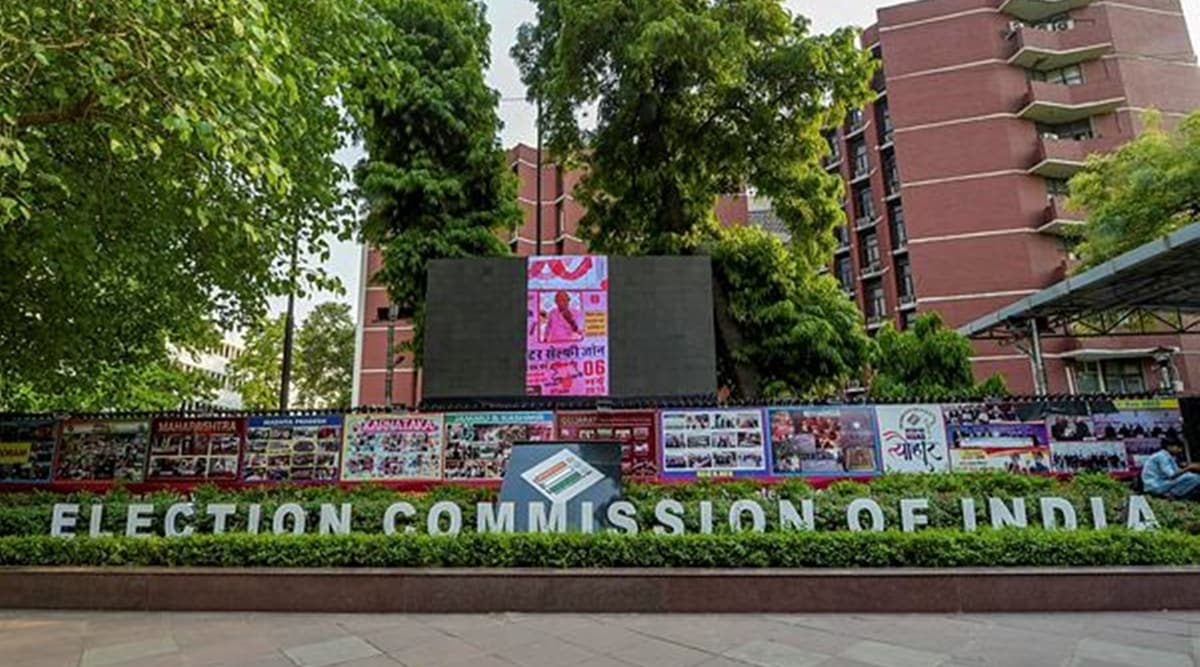 On Tuesday, therefore, the EC's note to political parties, in the name of voter disclosure, marked a U-turn by the poll panel. (PTI File Photo)
On Tuesday, therefore, the EC's note to political parties, in the name of voter disclosure, marked a U-turn by the poll panel. (PTI File Photo)JUST weeks ago, the Election Commission told the Supreme Court that “freebie” and “irrational” are subjective and open to interpretation. Acknowledging that “freebies can have different impacts on society, economy, equity,” the EC admitted it would be an over-reach of its powers to regulate policy making on the subject.
On Tuesday, therefore, the EC’s note to political parties, in the name of voter disclosure, marked a U-turn by the poll panel.
The EC’s demand of political parties to juxtapose the cost of promises and the funding sources alongside revenue and expenditure estimates in the state or Union Budget, and assess the impact on fiscal sustainability, is a departure from its earlier hands-off approach adopted in its various affidavits submitted to the Supreme Court.
The EC’s intent seems to weigh in substantively in the freebie debate that gathered momentum after Prime Minister Narendra Modi targeted political opponents mid-July and cautioned people against the revdi culture saying it is “very dangerous” for the country, its development and well-being.
On April 9, the Election Commission told the Supreme Court that offering or distributing freebies in the run-up to election was a policy decision of political parties and questions like whether such policies were financially viable or would have an adverse impact on the economic health of a state was to be considered and decided by the voter.
In an affidavit to the top court, the ECI had said it cannot regulate state policies and decisions which may be taken by a party after they form the government as such an action, without the backing of law, would be an overreach of powers. The affidavit was filed in response to a petition by advocate Ashwini Upadhyay who wanted the court to prohibit parties from promising “irrational freebies” drawing from public funds and prescribe a standardised manifesto format for all parties.
“The Election Commission of India cannot regulate state policies and decisions which may be taken by the winning party when they form the government. Such an action, without enabling provisions in the law, would be an overreach of powers,” it had said in April this year.
Less than two months ago, on August 11, the EC filed a supplementary affidavit in which it argued that “there is no precise definition of the term ‘freebies’ in the existing legal/ policy framework and that it is difficult to define the term ‘irrational freebies’, as both `freebie’ and ‘irrational’ are subjective and open to interpretation.”
The supplementary affidavit, filed by the ECI in response to the apex court’s displeasure over its earlier stand, also stated that “freebies can have different impacts on society, economy, equity, depending upon the situation, context and time period”. In fact, with the top court suggesting the setting up of a committee to suggest ways to deal with the issue of promise of freebies, the EC made it clear it won’t be appropriate for it to be part of such a committee. “…it may not be appropriate for the (Election) Commission, being the Constitutional Authority, to offer to be part of the Expert Committee, especially if there are Ministries or Government Bodies in the expert body,” it said.
The ECI had taken a similar stand in January 2020 in another pending petition filed by Pentapati Pulla Rao, who contested as a candidate of the Janasena Party from Eluru Parliamentary constituency in Andhra Pradesh in 2019 national elections, questioning direct cash transfer schemes and freebies.
In its letter to political parties Tuesday, the Election Commission said it agreed in principle with the point of view that framing manifestos is the right of the political parties, but cannot overlook the undesirable impact of some of the promises and offers on the conduct of free and fair elections and maintaining level playing field for all political parties and candidates.
So, while the Election Commission refrained from defining freebies and explicitly didn’t seek to regulate them, it put the onus of spelling out the extent and expanse of freebies, their financial implication, the funding mechanism, and the effect on fiscal sustainability of the state or Centre, on political parties.